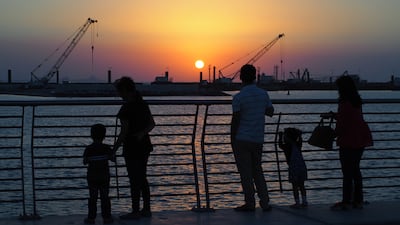Suneeta Thomas’s doctoral dissertation for Purdue University in the United States explores the use of English in the daily lives of Dubai’s middle class. Her research upends traditional theories of applied linguistics, but those who call Dubai home will not be surprised by her findings: namely, language in Dubai is dictated by convenience rather than prestige. In short, people use whatever works.
There are many theories for understanding the use of English. For example, advocates of linguistic imperialism argue that imperialism is still a force and, with it, imposition through language. But others, such as World Englishes, take the view that people have reinvented English for their own use.
As a student of applied linguistics in the US, when Thomas didn’t see her “typical, Indian middle class” Dubai upbringing represented, she returned home to find answers. She surveyed 128 Indians, Filipinos and Pakistanis from Dubai and conducted 13 interviews. Her doctorate thesis examines perceptions towards English and its use in the workplace and daily life.
Thomas found that people in Dubai opt for ease over identity politics, switching between languages until the best way is found to communicate. While a social or political elite traditionally dictates which language dominates, in Dubai, the elite and middle class switch to the language of the working class.
“What I noticed across the board is people tend to revert to a language most comfortable for communication rather than showing pride or a sense of modernity or difference,” says Thomas, who is an assistant professor at Missouri State University. “That was, in some sense, a very endearing fact. We don’t want to create differences. I don’t want to show I’m different, rather, let me try a language that you probably understand.”
Here English is not considered an advantage, a source of pride or modernity, unlike in India where it is seen as a colonial legacy. Nor is its use considered detrimental to other languages. It’s just part of everyday life.
Academics and traditionalists have often pegged English acquisition as a necessity associated with modernity and professional advancement.
This is not the case in Dubai, according to Thomas’s research. Speakers did not consider English foreign, modern or a means to a great life. Instead, knowledge of English and its usage was taken as a given, neither a positive nor negative signifier, but simply an ordinary part of an everyday life.
“English exists, but it’s not a great thing,” Thomas’s uncle told her upon learning of her research topic. Why study something so commonplace?
“The literature has been saying that English is a golden rite of passage, you need it to succeed,” says Thomas. “While that is true, this population already possess English and yet their life is normal and regular. We’ve moved so much from that position in history. English just exists and is very much a part of their identity.”
Similarly, in Thomas’s Dubai-based research, speaking English was not perceived as a threat to the mother tongue, but a parallel language.
Most participants were young, highly educated and three-quarters were Indian. Nearly half were raised in Dubai. Both Pakistani and Filipino respondents had a preference for their mother tongue in the personal domain. Pakistani nationals often defaulted to Urdu in the public domain rather than English.
Among Indian participants, English was so common that it was used 60 per cent of the time when interacting with friends, even among those who could converse in Hindi. This prevalence reflects India’s linguistic diversity; English is one of it’s 22 official languages.
But part of this, argues Thomas, is also Dubai’s imprint. Her personal story is telling. She attended an expatriate school for Indian students in Dubai, where classes were taught in English and it was natural to speak English among friends. Her parents also spoke to her in English but to each other in their mother tongue, confident she would learn Malayalam through attending church and the occasional Malayalam movie. They’d also watch Hindi television channels, Bollywood films on weekends and listen to Hindi radio stations in the car.
It was a typical Dubai childhood. “Obviously there are some peers who had just the opposite experience, but this has definitely been the norm,” says Thomas.
Her research also highlights Hindi as a parallel lingua franca in Dubai. Interviewees said Arab officials in the public and private sector tended to communicate in Hindi or Urdu with the working class, and occasionally the middle class.
“This is amazing, again underlining the importance of convenience rather than difference,” says Thomas. “Historical tendencies have shown that in any context the language of the elite or the rich class tends to govern how the language is used.
“I think that’s an interesting dynamic, which probably sheds light on how the country generally tries to be very friendly and accommodating to the expat population. The overarching theme would be communication and convenience rather than generating difference.”
Language, after all, ought to be about understanding. In this way, Deira and Satwa get it right.
Anna Zacharias is an independent journalist based in Muscat.

